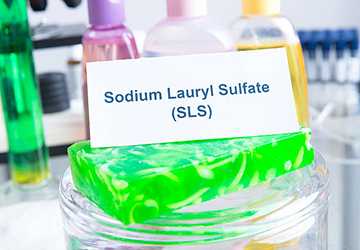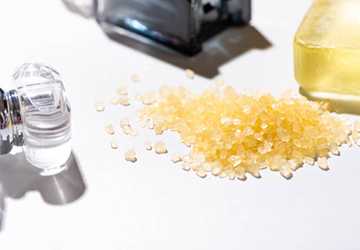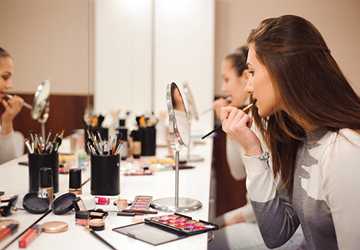In the contemporary epoch of consumer enlightenment, discernment regarding the constituents of habitual products is paramount. Sodium Lauryl Sulfate (SLS), a ubiquitous surfactant, has become a focal point of contention. This exposition endeavours to illuminate the dangers of SLS and advocate for the adoption of SLS-free products.

An Analytical Discourse on Sodium Lauryl Sulfate
Sodium Lauryl Sulfate, a prevalent ingredient in myriad personal care commodities, is lauded for its efficacy in dislodging sebum and debris. Nevertheless, the deployment of SLS has engendered a litany of concerns spanning both health and environmental ramifications.
● Epidermal Ailments: Individuals with sensitive epidermis may experience an onslaught of inflammatory responses, including erythema, desiccation, and pruritus, under SLS's aegis. The virulent attribute of Sodium Lauryl Sulfate dismantles the integumentary barrier, escalating susceptibility to irritants.
● Speculations on Enduring Detriments: The narrative concerning the chronic ramifications of SLS exposure is fraught with conjecture about its potential to precipitate severe health difficulties. These anxieties underscore the imperative shift toward SLS-free products.
The Virtues of Opting for SLS-Free Commodities
The preference for SLS-free products transcends the avoidance of cutaneous discomfort, heralding an era of augmented well-being and environmental stewardship. Herein lies the justification for this paradigm shift:
● Cutaneous Flourishing: Abstention from Sodium Lauryl Sulfate nurtures the skin's endogenous hydration and protective mechanisms, fostering enriched dermal health.
● Advocacy for Ecological Integrity: SLS-free products epitomize the confluence of biodegradability and minimal environmental encroachment, courtesy of their innocuous constituents.
Unraveling the Market for SLS-Free Alternatives
The burgeoning quest for non-toxic and ecologically harmonious offerings has catalyzed the expansion of the SLS-free products marketplace. Navigating this nascent terrain requires astuteness:
● Diligence in Component Examination: Diligently inspect labels for the inclusion of Sodium Lauryl Sulfate or its kin.
● Devotion to Principled Manufacturers: Gravitate towards manufacturers who are unwavering in their commitment to SLS-free products and embody transparency in their ingredient disclosure.
Delving into the Ecological Consequences of SLS
The discourse surrounding the ecological ramifications of Sodium Lauryl Sulfate (SLS) reveals a narrative that extends beyond its impact on human health. A thorough examination of SLS's ecological footprints reveals that transitioning to SLS-free products transcends personal preference, elevating it to a global imperative.
● Detriment to Aquatic Habitats: Investigative studies have illuminated that SLS poses a significant threat to aquatic ecosystems, jeopardizing the existence and fecundity of marine organisms. This revelation amplifies the critical need for environmentally mindful consumers to advocate for SLS-free products.
● Impact on Terrestrial Health: The infiltration of SLS compounds into the Earth's crust goes beyond aquatic concerns. It can potentially jeopardize terrestrial biota and degrade soil quality. This fact accentuates the importance of environmental guardianship when choosing SLS-free products.

Advancements in SLS-Free Product Technologies
The shift towards SLS-free products has ignited a wave of innovation in cosmetics and personal care, setting pioneering benchmarks for safety and effectiveness.
● Botanical Surfactants: The renaissance of green chemistry has birthed the creation of botanical surfactants, which match the efficiency of SLS sans the associated detriments and heralds a sustainable and benign option for the populace.
● Microbiome-Conscious Offerings: The burgeoning field of research into the skin's microbiome has yielded formulations intent on maintaining and enhancing the skin's microbial harmony, thus promoting optimal skin health devoid of harsh substances like SLS.
The Crucial Role of Consumers in Advancing SLS-Free Initiatives
Manufacturers are not the sole drivers behind the shift to SLS-free products; consumers wield significant influence in steering this change. Here’s how personal decisions can ripple through to effect widespread transformation.
● Informed Selections: Armored with knowledge about product ingredients and their environmental and health impacts, consumers are empowered to make decisions that resonate with their ethos of health and ecological stewardship.
● Advocacy for Transparency: The consumer contingent possesses the clout to demand uncompromised clarity from corporations regarding their product compositions, nudging the industry towards more morally sound practices.
Envisioning a Future of Sustainability
The dialogue surrounding Sodium Lauryl Sulfate and its substitutes indicates a broader momentum toward sustainable living and conscientious consumption. As the collective embrace of SLS-free products strengthens, we edge closer to a paradigm where personal care is not at odds with the welfare of our health or the planet.
● Elevation of Global Health and Environmental Standards: The advocacy for SLS-free products is prompting international regulatory agencies to reconsider and potentially fortify the regulations surrounding cosmetic constituents, charting the course for safer, more sustainable product landscapes.
● Prominence of Eco-Friendly Chemistry: The departure from SLS and akin substances catalyzes the progress of eco-friendly chemistry, nurturing the development of novel, environmentally harmonious, and benign chemical methodologies and materials.
Pioneering the Future of Cosmetics: The Shift to SLS Alternatives
Embracing Botanical Vigor: The Rise of Phytoactive Compounds
In the evolving landscape of personal care, the momentum towards SLS-free products is accelerating, catalyzed by integrating phytoactive substances. These elements, harnessed from the Earth's flora, deliver exceptional advantages, sidestepping the detrimental repercussions commonly linked with synthetic agents.
Utilization of Plant-based Antioxidants for Dual Purposes:
Infusing personal care items with plant antioxidants transcends mere cleansing benefits, introducing rejuvenating and restorative properties to the skin. This transformation marks a refined appreciation for leveraging the potency of nature in cosmetic formulations.
Enzymatic Cleansers: A Paradigm Shift in Skin and Hair Care:
The exploration into enzymatic cleaning agents represents an innovative stride towards preserving skin and hair's natural balance. Enzymes, acting as gentle yet potent catalysts, adeptly decompose unwanted particulates, epitomizing advancements in non-invasive personal care techniques.
Innovating for the Planet: Sustainable Packaging Initiatives
The journey towards SLS-free products concurrently propels a movement dedicated to environmental stewardship through sustainable packaging innovations. The burgeoning eco-conscious consumer base propels the demand for packaging that respects planetary boundaries.
Conclusion
The discourse regarding the dangers of Sodium Lauryl Sulfate is intensifying, paralleled by a burgeoning consensus on the virtues of SLS-free products. Electing such alternatives mitigates health risks, enhances dermal vitality, and exemplifies a commitment to planetary stewardship. As the dialogue surrounding ingredient safety and eco-consciousness proliferates, the gravitation towards SLS-free products is a testament to a more discerning and conscientious consumer ethos.















